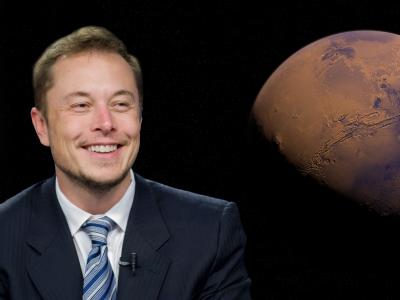Elon Musk is a lightning rod for analysts, whether you like him or not. His endeavors have been lauded for their forward-thinking approach (Tesla electric cars; Boring Co.) and slammed as distractions (Tesla Semi, SolarCity).
Musk should, and will, add another side project, according to Morgan Stanley (NYSE: MS) analysts: electric vertical takeoff and landing (eVTOL) vehicle.
“Tesla’s (NASDAQ: TSLA) management has actively denied conjecture about their engagement in eVTOL/UAM to this point. So, that’s all there is to it… Teslas will be on our roads, underground in tunnels, and even on Mars. But not in the skies of the Earth? We’re not convinced, to be honest “the report’s authors stated.
Morgan Stanley has adopted an overweight rating on Tesla, with a price objective of $900 per share that excludes aviation-related advantages, according to Morgan Stanley. A Tesla Aviation segment could bring in anywhere from $100 to $866 per share based on a 4% Tesla eVTOL market share and a 25% EBITDA margin to $866 per share based on a 20% market share and a 40% EBITDA margin.
The research group estimates that by 2050, the worldwide total addressable market (TAM) for eVTOLs would be worth $9 trillion.
Tesla did not respond to a request for comment on the article from Modern Shipper.
“While we believe Tesla has transferrable talents to the UAM market in several crucial areas of technology and business models, we do not consider the value of addressing this market in our Tesla price estimate at this time. At this time, we do not believe UAM/eVTOL will be on the company’s ‘priority list’ for 2021. However, we urge investors to examine Tesla and other car OEMs’ prospective prospects “Morgan Stanley made a point in their note.
Related:
The number of transferable talents Tesla has developed through its different projects and manufacturing prowess is one of the study’ pillars. Tesla’s competence in electric motors, battery development, and autonomy, as well as vertical manufacturing, networking, and software and communications knowledge, were noted.
Morgan Stanley isn’t the first to support a Tesla project, or a rumored Tesla project. “We feel the Tesla truck opportunity is real and is a natural market adjacency to the personal transport model,” analyst Adam Jonas wrote in a note regarding the unveiling of the Tesla Semi in April 2017.
Jonas remarked at the time that he couldn’t see the Semi being worth more than 10% of Tesla’s market cap.
Tesla has already resolved some of the manufacturing challenges that were impeding car production, but the Semi has yet to enter production.
Market is crowded.
While the concept of Tesla entering the eVTOL market is the research’s focus, it devotes more room to an analysis of the broader market for eVTOLs, revisiting much of what Morgan Stanley initially described in its May 6 report “Urban Air Mobility/eVTOL TAM Update: A Sluggish Start, But the Sky’s the Limit “a report
The amount of firms working on eVTOLs, including Hyundai and General Motors (NYSE: GM), as well as a slew of startups, is one of the reasons many, including Morgan Stanley, are positive on them. Hyundai unveiled the S-A1 flying car concept at the 2020 Consumer Electronics Show. The vehicle would seat up to four passengers and be capable of traveling 60 miles at speeds of up to 180 mph.
Eve Urban Air Mobility and Helisul Aviation established a partnership earlier this month to develop an ecosystem-wide approach to UAM in Brazil, which is rushing to adopt the technology. By 2026, up to 50 eVTOLs will be operational in the country as a result of the agreement. Embraer, a well-known airplane manufacturer, is backing Eve.
Lilium also announced a seven-seat eVTOL and a merger with Qell Acquisition Corp. to take the eVTOL maker public in a SPAC deal earlier this year. JetBlue (NASDAQ: JBLU) and Joby Aviation have just announced a partnership to build electric eVTOLs.
A rating of overweight has been assigned.
Morgan Stanley presented bull, bear, and base case scenarios for Tesla stock, ranging from $450 to $1,272 per share, excluding any potential eVTOL impact.
“We expect that the next two to three years of electric vehicle growth will be mainly determined by who has access to the largest volume of low-cost batteries that can be reliably sourced,” the company said. “Using a bread truck as an example for battery cells, we believe the most successful electric vehicle players will be those closest to the bread truck. The bakery is owned by Tesla.”
At 12:00 ET, Tesla shares was down marginally in morning trading, trading at $650.89 per share. It’s down almost 28% from its January highs.
Morgan Stanley’s bull case expects Tesla will deliver 8 million vehicles by 2030 and will generate enough revenue from mobility/ridesharing, energy, third-party EV powertrain supply, and ancillary services such as insurance and linked fleet software. The bear case implies that Tesla’s EV sales are comparable to those of other OEMs, and that Tesla Mobility only achieves half of its predicted valuation, with all other sectors falling short of expectations.
Brian Straight’s Modern Shipper articles can be found here.
You might also be interested in:
Social Auto Transport has raised $1.5 million in seed capital to develop its auto-moving business in the gig economy.
Bringg’s partnership with Uber gives up new possibilities for e-commerce.
Walmart will start a drone delivery test this summer, according to Tumisu of Pixabay./n





